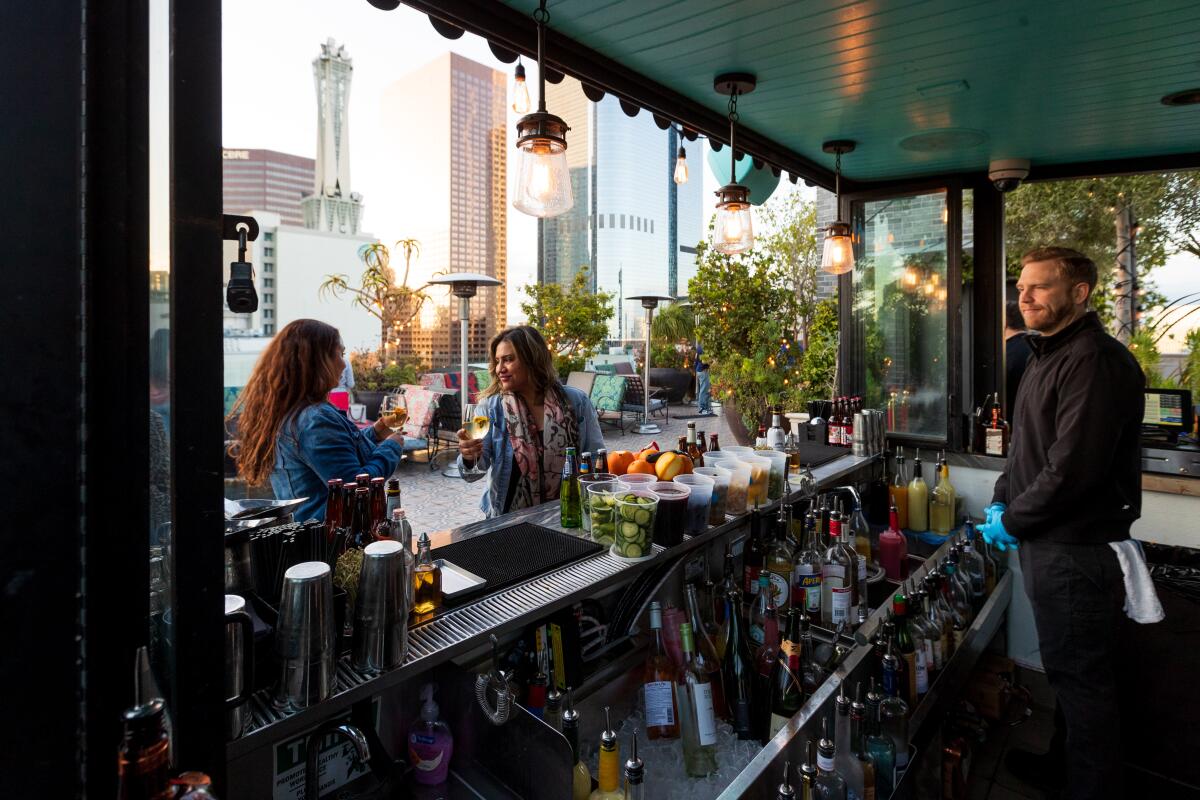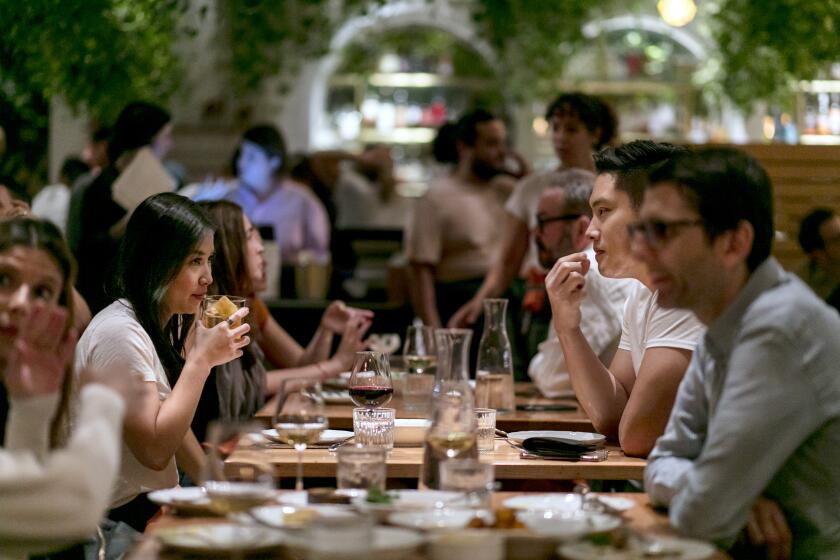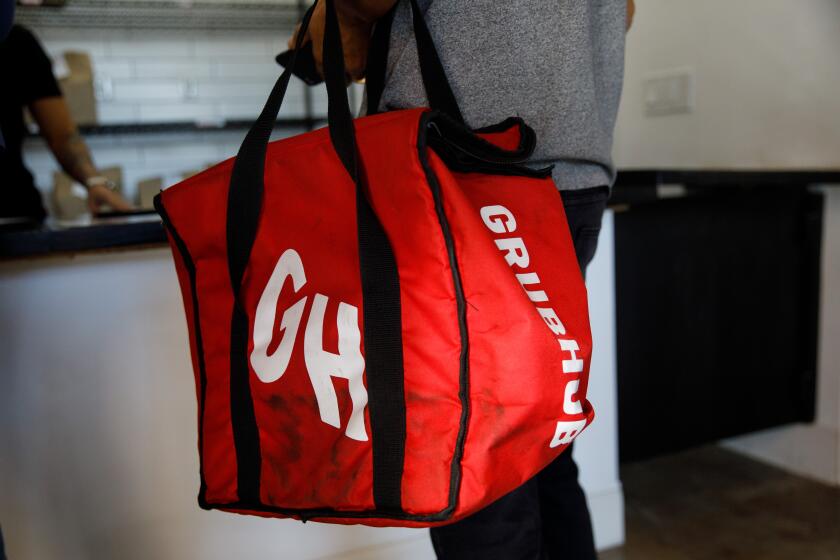Perch charges diners ‘security’ fee at downtown L.A. rooftop spot, sparking outrage

- Share via
A downtown Los Angeles restaurant is adding a “security charge” to diners’ bills, representing the latest in a wave of surcharges catching customers by surprise.
Perch, a rooftop bar and restaurant near Pershing Square, tacks an extra 4.5% charge to all customer checks to “ensure the safety for all staff and guests,” said Melody Lin, a Perch employee. According to the dinner menu on the restaurant’s website, “The entirety of the charge is retained by the restaurant for safety and security resources.”
A Reddit post by a user dubbed “Individual-Schemes” first brought attention to the fee, and not in a good way.
“Having security isn’t atypical,” the post said. “It’s included in our rent. All of the buildings down here have security. So why 4.5%? Why not $1.00 per check? Why this amount? How much does this fee generate for them per night?”
State lawmakers sought to ban surprise charges on consumers’ bills last year by passing Senate Bill 478, which goes into effect July 1. Applying to any business active in California, it declares that “advertising, displaying, or offering a price for a good or service that does not include all mandatory fees or charges” violates the state prohibition on unfair or deceptive practices.
Whether that law applies to restaurants, however, is subject to debate — apparently, even within state Atty. Gen. Rob Bonta’s office, and Bonta was one of the measure’s sponsors.
A state ‘junk fees’ law might ‘upend’ how restaurants operate. Customers could face sticker shock when fees are rolled into menu prices.
At issue is whether restaurants simply have to disclose their fees on their menus and in advertisements, or whether they have to fold the fees into the prices they charge for food and drinks.
Last year, a spokesperson for state Sen. Nancy Skinner (D-Berkeley), who co-authored the bill with Sen. Bill Dodd (D-Napa), told Eater SF that the legislation would permit service fees at restaurants if they were disclosed on menus. Representatives of the attorney general also told the San Francisco Chronicle that the law would not end fees but merely require them to be disclosed.
The attorney general’s office told Eater SF and The Times, however, that disclosing the fees was not enough — they had to be included in the prices on the menu.
Matthew Sutton, senior vice president of government affairs and public policy for the California Restaurant Assn., said in a statement that the law shouldn’t increase menu prices if it’s applied correctly.
“The law on its face does not apply to restaurants that properly disclose charges (nor was it intended to),” Sutton said. “Courts have repeatedly indicated that restaurant menus are not ‘advertisements’ and that restaurants don’t provide ‘goods or services.’”
County lawyers say the food delivery company has flouted state laws barring false advertising in promoting meals for less than the amount customers pay.
The Golden Gate Restaurant Assn. has asked Bonta’s office to clarify how its members will be affected by SB 478.
“While California regulatory authorities are expected to publish guidelines clarifying what exactly the law prohibits prior to July 1, there is uncertainty as to whether fees such as surcharges or service charges will be banned altogether or, alternatively, whether more conspicuous disclosure of such fees at the outset of the purchasing process will be sufficient to comply,” the law firm BakerHostetler said on its website.
Shareef Farag, a partner at BakerHostetler, has been advising his clients to just assume that they need to comply with SB 478’s requirements, even if their business type wasn’t specifically mentioned in the legislation.
“Given the breadth of the language, what we’re advising clients is to assume that it’s going to apply to them when the law goes into effect later this year,” he said.
Timothy Butler, an attorney for Greenberg Traurig, said in a statement that the law will probably prevent restaurants from charging service fees in the way they traditionally have — such as adding costs separate from food and beverage items.
“Instead, restaurants will probably be required to incorporate their previously charged service fees into their food-and-beverage related menu price of items,” he said in the statement. “In other words, rather than charging $15 for a menu item and a separate 10% fee ($1.50), a restaurant would instead be required to charge $16.50 for the menu item or to forgo some or all of the service-fee revenue.”
Restaurants probably will be allowed to state that their service fees have been included in the overall prices on the menu, Butler said. But that could also be tricky because they tend to run on tight margins and have already increased their prices to address rising costs.
“We expect restaurants to be very cautious in raising menu prices again to incorporate service fees, particularly as customers are already experiencing sticker shock when looking at food prices in general,” he said.
Some customers weren’t pleased with the new Perch fee.
“Us paying their security fee is crazy, if you think about it,” Earnest Traylor told KTLA-TV.
The attorney general’s guidelines for SB 478 could turn service charges into mere footnotes on a restaurant bill while raising the price of items on the menu. Or it could let restaurants impose all manner of surcharges, as long as they list the fees on their menus so diners will know about them before they order.
Either way, it would be costly for restaurants to defy the new law. The penalty per violation is at least $1,000.
More to Read
Sign up for Essential California
The most important California stories and recommendations in your inbox every morning.
You may occasionally receive promotional content from the Los Angeles Times.













